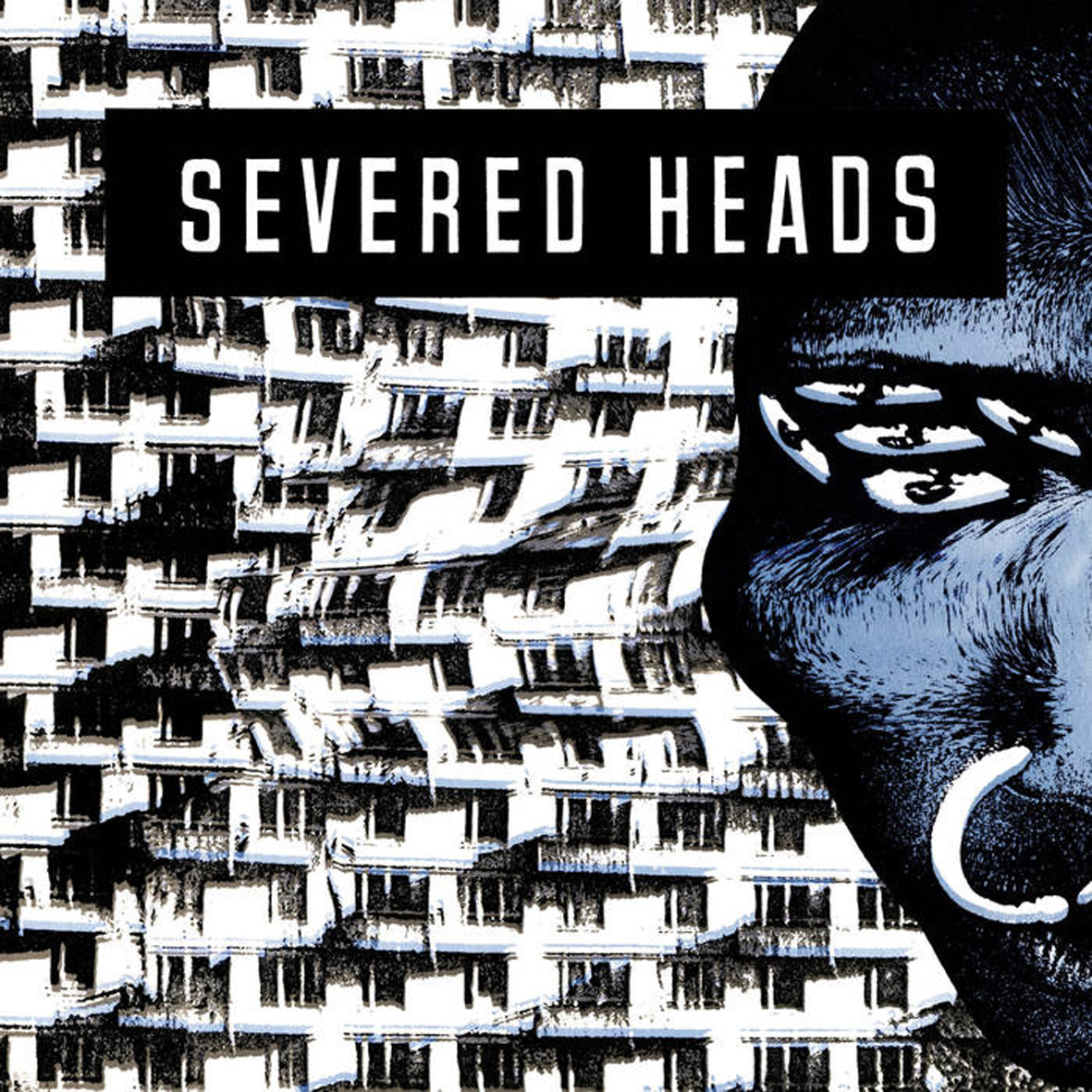Severed Heads, "Stretcher"
 I have long been a great admirer of Tom Ellard's prickly, erratic, and singular genius, but I completely slept on this deluxe reissue from Medical Records for much of the year, as I did not recall 1985's Stretcher EP as being particularly crucial or something that I would ever need to own on vinyl.  In that regard, I was mostly correct, but I was unaware that Stretcher had surfaced in so many different variations or that consolidating them all would yield an excellent double album.  Therein lays the genius of this reissue, as such an absolute avalanche of classic material from this era packs a lot of cumulative power.  In fact, this is probably the best single documentation of Severed Heads' golden age available: the brief window in the mid-'80s where Ellard’s deranged and perverse experimentalism started to take shape into eccentric and hook-filled pop structures.
I have long been a great admirer of Tom Ellard's prickly, erratic, and singular genius, but I completely slept on this deluxe reissue from Medical Records for much of the year, as I did not recall 1985's Stretcher EP as being particularly crucial or something that I would ever need to own on vinyl.  In that regard, I was mostly correct, but I was unaware that Stretcher had surfaced in so many different variations or that consolidating them all would yield an excellent double album.  Therein lays the genius of this reissue, as such an absolute avalanche of classic material from this era packs a lot of cumulative power.  In fact, this is probably the best single documentation of Severed Heads' golden age available: the brief window in the mid-'80s where Ellard’s deranged and perverse experimentalism started to take shape into eccentric and hook-filled pop structures.
The bizarre story of Stretcher makes my head spin, as it stands as an especially convoluted release in the canon of an artist whose discography is a messy labyrinth of long-dead record companies, self-curated CDR reissues, and differing international versions of seemingly everything.  Stretcher was originally intended as kind of an accessible sampler designed to optimistically break the band in the US, but then the idea and format transformed as the release was pitched for other markets, resulting in a Canadian EP, a differing UK EP, and (of course) a different LP for the band's home country of Australia.  Naturally, combining four commercially minded releases by a mostly rather difficult and unmarketable band makes for quite a bizarre and interesting grab bag.
A lot of the pieces included in Stretcher's various incarnations were new songs written specifically for the release, but anyone familiar with Severed Heads at all will likely recognize the inevitable "Dead Eyes Opened" and "Petrol," both of which appear in remixed form.  There is also a demo version of The Big Bigot's "Harold and Cindy Hospital."  Also, if I am not crazy, I think there are some sneakily re-titled songs that appeared in other forms elsewhere, as "New Explosions" is an altered version of City Slab Horror's "Now, An Explosive New Movie."  The vinyl version apparently includes helpful background information on each of these pieces, which belatedly seems like a reference I could benefit from.  Alas.  Despite all the real and possibly imagined recycling here, 1985 was unquestionably a compelling and creatively fertile time for the band, as remaining second member Stephen Jones turned Severed Heads' shows into a video-centric multimedia events while Ellard started dabbling in MIDI synthesizers for the first time, setting the stage for the more pristine and conventionally musical synth-pop that was to come later.
For Stretcher, however, Ellard's blossoming pop craftsmanship was still gloriously at odds with his zeal for amusingly obsessive use of samples and grainy tape experiments.  Even the somewhat unabashed stabs at pop are still extremely damn weird, as the upbeat and hooky would-be single "Halo" degenerates into a wonderful cacophony of piled up samples (including one of a man falling down the stairs and possibly an angry cartoon duck).  Also, Ellard’s brilliantly annoying sense of humor is still capable of making me smirk 30 years later, particularly as exhibited in the groove built from a woman’s surprised yelp in "Oscar’s Grind" or the obsessive and chopped repetition of the title phrase in "Don't Say It."  The latter is also a fine example of Ellard's singular ability to turn something initially obnoxious into something weirdly beautiful, as the sample gradually becomes surrounded by a vibrant and harmonically rich swirl of swooping and see-sawing tones.
While nearly all of the pieces included are shot through with some kind of deranged inspiration, it is the inclusion of "Blast Platter" and "Spurned" that makes this an absolutely crucial release for anyone interested in Ellard's work, as both easily stand among the greatest pieces that he has ever composed.  "Blast Platter' is a shuffling, brooding, and concise "pop" song built upon what sounds like a gibbering and warped opera sample.  While I love the sample, the rest of the song is even more perfect, as it unexpectedly erupts into a gorgeous synth motif and boasts a surprisingly understated and haunting chorus.  If I played it for a friend and they did not sufficiently appreciate it, I would demand to know when their soul died.  "Spurned," on the other hand, goes in the complete opposite direction, weaving a ghostly web of collaged female classical vocal loops into a ten-minute epic that resembles an industrial-damaged Lisa Gerrard piece heard through a heavy fog of drugs.
Naturally, there are some elements to this material that can reasonably be considered primitive or dated (particularly the beats), but I personally find them largely endearing.  I suppose it could also be argued that Stretcher could do without re-heated and over-familiar material like the 12" remixes of the bands' "hits," yet those pieces probably provide a welcome foothold for newer listeners to embrace until the weirder, less accessible bits start to burrow into their subconscious.  Ultimately, it is those weird bits that make Severed Heads special: Stretcher does not always capture Ellard at the top of his songwriting game, but it does capture an aesthetic zenith of sorts, as this is the ephemeral sweet spot where deranged experimentation, burgeoning pop instincts, and general ballsiness were in perfect harmony.  Stretcher's true charm lies in how compellingly and consistently Ellard manages wrest sublime beauty from obstinate contrarianism, a gleefully impish sense of humor, and unfettered imagination.  The results are sometimes messy, clunky, or amusingly annoying, but they never sound like anyone else and the occasional moments where everything falls gloriously into place make it all worthwhile.  Medical Records has truly achieved a feat of curatorial wizardry here, assembling far-flung odds n' ends into an album that rivals or surpasses most of Severed Heads' acknowledged classic albums like City Slab Horror or Since the Accident.  While it is admittedly possible that the novelty of this material is still clouding my generally unerring judgment, I happily pair this album with Cuisine as one of the two most essential releases in the Severed Heads discography.
Samples:
 



